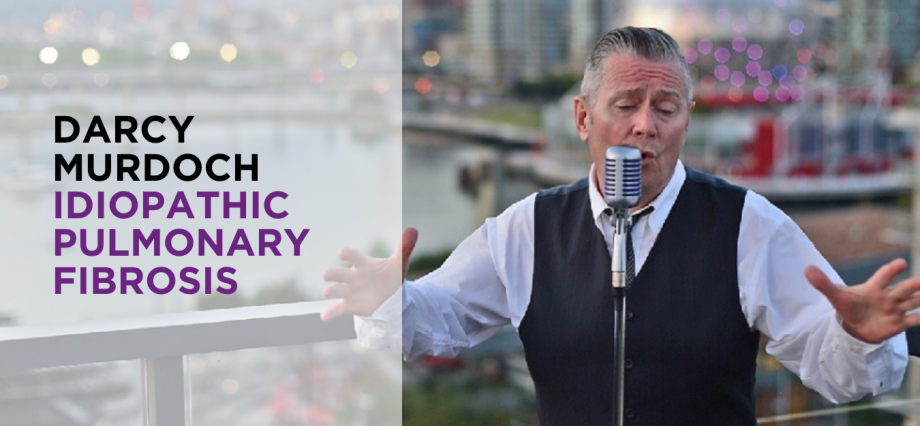I’ve played many roles as an entertainer. I can effortlessly riff between two alter egos – crooner Bobby Bacchus to the King himself, Elvis Presley. But no role has challenged me more than that of patient.
When did you realize your health was becoming serious?
With my outgoing personality and love of people, I was well suited for long careers in both catering and entertainment. However, the catering lifestyle took a physical toll. Long hours on my feet, rich meals at odd hours and constant heavy lifting were affecting my health. As a former smoker, I was used to feeling out of breath, but when I began to wheeze and cough more frequently, I knew something more was at play. My doctor suspected a chest infection, but x-rays proved otherwise. In 2011, at the age of 54, I was diagnosed with Idiopathic Pulmonary Fibrosis (IPF).
How did you learn to process this diagnoses?
A native of Saskatoon, I had no family nearby for support. But a visit back home gave me the assurance that my family was behind me. My initial reaction was fear, trepidation, anger, and depression. I had my little pity party for about six month. Then I snapped out of it.
Did you need a lung transplant?
Like all IPF patients, I needed a lung transplant to survive. I started working out like a fiend and shifted my way of thinking to become more positive. Support groups helped immensely. You can be like a deer in headlights. But at the first one I went to there were three or four people that had what I had and had had transplants. I was able to talk to them and ask questions. You get to know the people. It’s like a little family. There’s a closeness involved.
How did your life change as your illness progressed?
As an entertainer, I was dependent on gigs to pay my bills. But my condition kept me from working as much as usual. I would have five to eight 20-minute coughing fits a day. In September 2014, while awaiting a lung transplant, I had a busy Christmas season lined up, including playing roles as Santa, Whistles the Clown, and headlining as the singer at a newly opened restaurant in West Vancouver.
Despite my worsening condition, I made the difficult decision to take myself off the transplant list for three months. I needed to save enough to be able to take time off while recovering from the surgery.
Afterwards, while awaiting transplant, I participated in a study with Dr. Chris Ryerson at St. Paul’s looking at the importance of exercise. They called me the PFT (pulmonary function test) champion.
When did the stars align for you?
I finished my final restaurant gig on December 22nd, 2014, paid my bills, and got the call for a transplant six weeks later. I was ready to go in every way. I was 58 and had a lot of living to do. On January 30th, 2015 I underwent a bilateral lung transplant. As I was being prepped for surgery, the operating nurses piped in Sinatra’s Come Fly With Me. I felt then that everything was going to turn out ok. And it did.
How did exercise play a critical role in your recovery?
I can’t say enough about the important role exercise has played in my recovery, both mentally and physically. I worked out 400 times in two years at home, and I believe that’s what has put me in the position I’m in here today. With a proper diet and daily sessions in my home gym, I lost close to 40 pounds as I waited for my transplant. Even if I didn’t want to, I did it anyway. I knew if I was healthy going in, it would bode well for me coming out.
How did your positive approach to wellness and recovery make you a transplant success story?
Whether I’m wearing oversized clown shoes or blue suede shoes, I bring my heart and soul to whatever role I play. I did that with my role as patient. A positive approach to wellness and recovery has made me a transplant success story. Life is amazing. After a lung transplant, there are always issues with medications, but those have eased off. On a scale of one to ten, I give life a nine.
The BC Lung Association came to my aid at this critical time. A grant helped me make car payments over my three-month recovery. I am back at my rigorous workout schedule and am once again booking gigs, including lending my services at BC Lung events. I can’t wait to perform a free Bobby Bacchus show to express my thanks to the hospital staff this Christmas. Santa Claus might even make an appearance!
What questions still need answering about IPF?
Is IPF hereditary, for example? My father, a Saskatchewan farmer, died of the same disease at 58 – the same age I was when I received my lung transplant. My father’s condition was called “Farmer’s Lung”, which is caused by long-term inhalation of grain dust and moldy hay spores. I can still picture my father on heavy oxygen and looking very, very ill. My father also had the same-clubbed fingers that I developed from long-term lack of oxygen. Looking back on my family tree, I can identify other relatives who have had lung disease, so I am keen to help demystify it any way I can.

